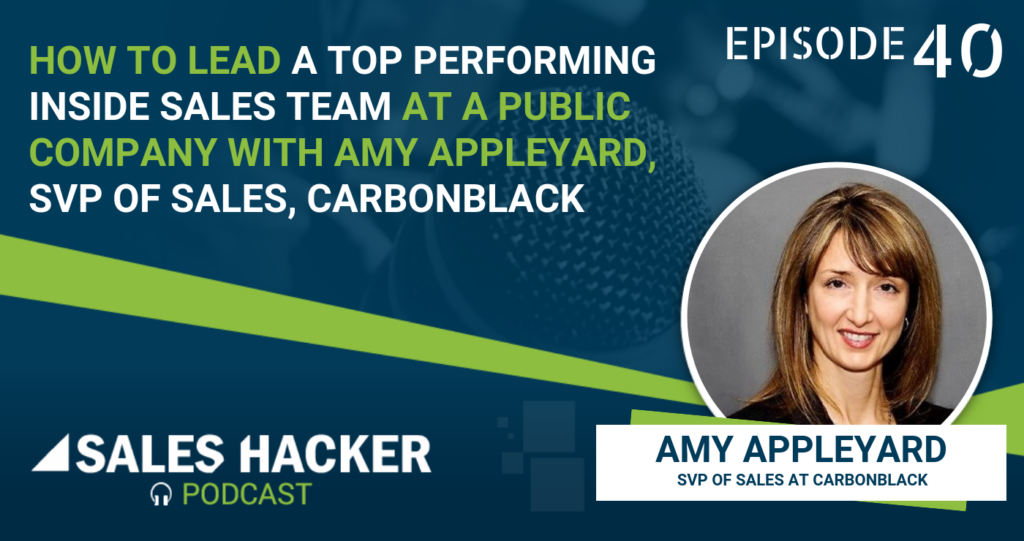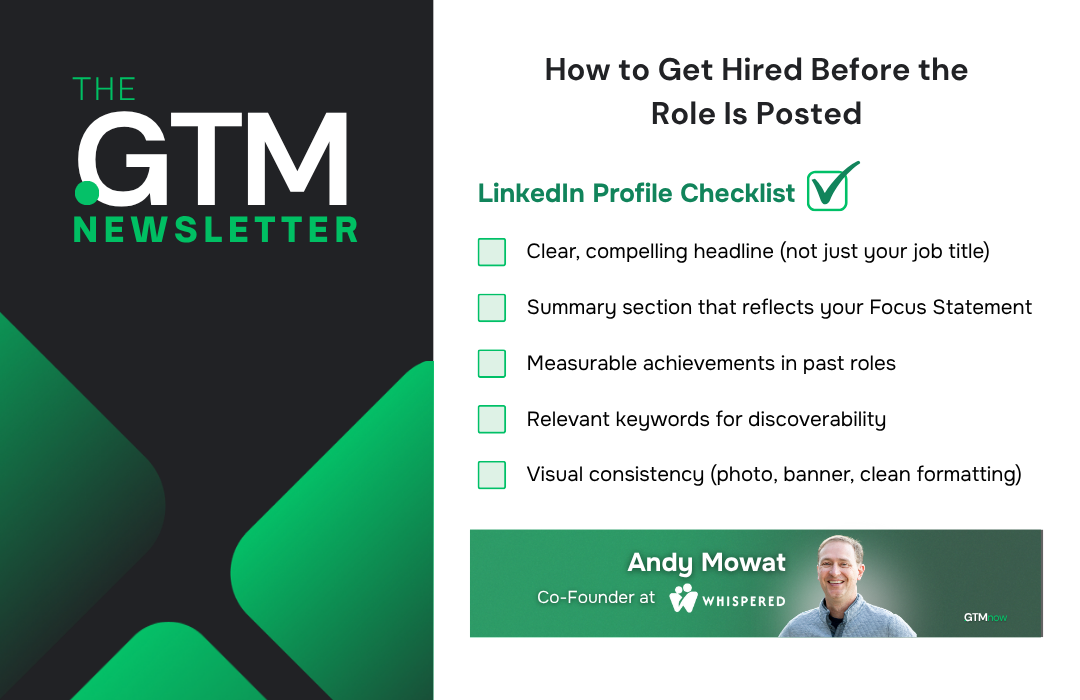This week on the Sales Hacker podcast, we talk to Amy Appleyard, the recently appointed SVP of Global Inside Sales at CarbonBlack.
Amy walks us through her background from being an SMB entrepreneur to leading large sales teams and why sales emerged as her true calling. Amy combines raw intellect and analytical capability with a passion for sales resulting in an incredible and effective sales leader at a fast growing public company.
If you missed episode 39, check it out here: PODCAST 39: How to Build A Startup Inside One of the World’s Biggest Tech Companies
What You’ll Learn
- How to have the right mindset for career acceleration
- The biggest challenge facing managers and keeping them from the C-suite
- How to grow and scale an inside sale org for predictability
- Key things to think about for women in sales leadership positions
Subscribe to the Sales Hacker Podcast
Show Agenda and Timestamps
- Show Introduction [0:09]
- About Amy Appleyard: An Introduction [02:18]
- Building Influence and Advocacy When Inheriting a Large Team [06:04]
- From Theatre to SVP; How to Know if Sales is for You [20:30]
- Keeping a Company Perspective and Metering Rep Empathy [25:05]
- Laying the Foundation for the Future of Women in Executive Sales Positions [34:30]
- Sam’s Corner [46:50]
Sales Hacker Podcast—Sponsored by Chorus and Outreach
Sam Jacobs: Hey everybody, it’s Sam Jacobs. Welcome to the Sales Hacker podcast. Welcome back, it’s really exciting to be in the heart of 2019. We’ve got a bunch of incredible guests that are lined up for the year. We’ve got, today on the show, Amy Appleyard, the SVP of global insight sales for Carbon Black.Amy graduated from undergrad with a theater degree, she’s an entrepreneur, and ultimately found her way to the sales organization where she ended up running very large teams and doing incredibly well. She’s got a great mix of analytical and strategic skills, coupled with people skills, and she really cares about the teams and the people that she works with. She’s sort of a rising star in the Boston technology scene, and the Boston sales leadership scene.
Now, before we get to the interview, we’ve got some sponsors. We’ve actually got a brand new sponsor. So the first is Chorus.ai. Chorus is the leading conversation intelligence platform for high growth sales teams. They record, transcribe, and analyze business conversations in real time to coach reps in how to become top performers. With Chorus.ai, more reps meet quota, new hires ramp faster, leaders become better coaches, and everyone in the organization can collaborate over the actual voice of the customer.
Our second sponsor is our friendly neighborhood Outreach, the leading sales engagement platform. Outreach triples the productivity of sales teams and empowers them to drive predictable and measurable revenue growth by prioritizing the right activities and scaling customer engagement with intelligent automation. Outreach makes customer facing teams more effective and approves visibility into what really drives results.
Now, without further ado, let’s go to the interview.
About Amy Appleyard: An Introduction
Sam Jacobs: Hey everybody, it’s Sam Jacobs. Today, I am incredibly excited to have Amy Appleyard on the show. Amy Appleyard is the SVP of global inside sales for Carbon Black, a leading cyber security company specializing in Next-Gen Endpoint security solutions. Prior to Carbon Black, Amy was VP of sales for LogMeIn’s communications and collaboration line of business. We’re really excited, Amy, to have you on the show.
Amy Appleyard: Thanks for having me. I’m a big fan of the podcast, I’m honored to be here.
Sam Jacobs: So, tell us in your own words what Carbon Black does.
Amy Appleyard: Just a little background on the company. We are a cyber security company based in Waltham, just outside of Boston. About 1000 people in total. A couple of hundred inside sales reps, and we’re hovering at around $200 million now, with plans to keep on growing. My teams help to provide endpoint security solutions for IT and security professionals. The solutions that we provide make it easier for defenders to protect the endpoints, and then harder for the attackers to get in. There’s a lot of folks out there doing similar things along the lines of ours, but we’re pretty proud of what we built, and the customers we’re serving. Continuing to innovate, and just having a blast doing so.
Building Influence and Advocacy When Inheriting a Large Team
Sam Jacobs: You just inherited a very large team–how do you prepare for that? How do you build influence and advocacy within such a large team, as somebody that’s sort of inheriting all of these hiring decisions? What’s your strategy? What’s your philosophy?
Amy Appleyard: I had spent time with the directors when I first came onboard, and then also with the management team, explaining to them who I was and what was important to me. I tend to be somebody who really digs into the details, and it’s not because I’m a micro-manager, it’s just because I want to really understand things.
I asked them for help in getting to know their teams, and understand their pipeline and everything that was going on within the business as fast as possible. I probably spent a good portion of my first month on the job just getting to know people.
The other was to really understand the customers as quickly as I possibly could, because that’s what we’re all here for. So, I connected with our SE Team, our Solutions Engineering team, and said, “Fill my calendar with as many demos, POC’s, everything as possible, as you can … any space you can find, fill it.” Because then I would get the benefit of not only meeting more of my sales reps and getting to know them on a personal level, but listening in on the questions that customers were asking, and getting to see demos of the products.
RELATED: How To Build An Inside Sales Team From Scratch
From Theatre to SVP; How to Know if Sales is for You
Sam Jacobs: I guess for a lot of people out there, it’s very difficult to major in sales. So lots of people aren’t sure whether this is a career for them.
What is your advice–how do you know it’s a career for you? What are the elements that really resonate?
Amy Appleyard: I like how you asked that question, because people have asked me similar things, but never in quite that way. I think in terms of resonating–how do you know what you want to do for the rest of your life? I don’t think you ever know what you want to do. When I started working in sales, I felt like myself. I just felt like, ‘I know what I’m doing. I’m much more confident, I really enjoy this, this makes a lot of sense to me.’ So there was just a natural feeling there.
That said, I do talk to a lot of younger folks who are thinking about it. I always say you should absolutely try if you think you have any interest in it, because you will learn so much about the business and about the customer. It just gives you these incredible building blocks for anything that you might want to do. Especially for somebody in marketing who might be interested, you have so much more credibility with any sales organization you ever might want to serve, if you head back into the marketing role.
Keeping a Company Perspective and Metering Rep Empathy
Sam Jacobs: Too much empathy can be almost be a bad thing, in the sense that you have to be able to make tough decisions. For example, decisions to raise quota, or decisions to commit to a number around a new product before you have enough market feedback–are those some of the decisions where, if you’ve come up directly from the ranks, maybe you’re too sensitive?
Amy Appleyard: Yeah, absolutely. I think that is the hardest thing for folks, especially with moving from a manger to a director role, where you kind of turn from really empathizing with the rep, to being company first, right? That is a very difficult thing for many people to get over. I probably over empathize in other situations with the reps, because I do understand how challenging it is.
I do think that it’s a great thing for people to learn, and I think that I can provide perspective, and have certainly helped coach people into thinking slightly differently, and tipping the scale more toward company first as opposed to individual first.
Being able to demonstrate that you can separate yourself from the immediacy of some of the decisions is important.
Laying the Foundation for the Future of Women in Executive Sales Positions
Sam Jacobs: So, I don’t know if it’s an elephant in the room, but it’s a fact of life, which is that you have three kids. You’ve chosen a really difficult path, and you’re kicking ass at it. What’s your advice? I think specifically, it’s harder, candidly, for women than for men.
How have you thought about your career? We need and want more women in executive sales positions. What’s the advice that you give to the up and comers, and how do you lay that foundation for the future. How did you approach it?
Amy Appleyard: I do like this question, and I tend to speak pretty openly and freely and personally, when asked questions like this.
There’s a couple of different things that happened for me.
1. I married the right guy.
My husband is amazing, and it’s a partnership. He actually, when the twins were maybe three or four years old, he made the decision to work freelance from home. That was one of the best decisions we ever made.
He is doing well, and he spends a ton of time with our girls. So, he knows how to put the hair in buns for ballet. He can drives carpools. He’s on more of a texting basis with all the moms in my neighborhood than I am. So, I think we had a good kind of balance there.
2. I don’t cook.
I would rather, on the nights where I offer to do dinner, I order out, or I order in for us. Or I take people out, or we do something different. I’m happy to pay for somebody to clean my house. There are things that I just don’t put a burden on myself. That is a choice or a decision that you make. When I have free time, I want to spend it with my family.
Sam Jacobs: Do you believe that people can have it all?
Amy Appleyard: You’ve just got to define what your all is. I think it ebbs and flows, right? This is what we’re doing for now. Everything is working, but it might not always be this way. I think one of the things I really love about working in sales is that the personal and professional lives can so blend together. I don’t think of it as a balance, I just think of it as this is my life.
Sam Jacobs: I love it. Amy, thank you so much for joining us on the Sales Hacker Podcast, it’s been a great conversation.
Amy Appleyard: Thank you for having me.
Sam’s Corner
Sam Jacobs: Hey everybody, it is Sam Jacobs, this is Sam’s corner, and really, really enjoyed that conversation with Amy Appleyard. She has just the right combination of skills required to be a really effective sales leader. She’s got the right level of empathy, she’s got the right analytical approach, and she just has a passion for sales itself.
We talked about how she’s managing a family of three, while she runs a team of over 200 people. She had an honest conversation with her partner, with her husband. They divided up the responsibilities, and her husband is the guy that stayed at home, and helped raise the kids and tackle the majority of the domestic responsibilities. I think what it tells you, if you’re in a relationship, honest communication is always so important. It’s important with the prospect, it’s important with your partner.
The second thing that she said, directly related to sales management, she said, “You know, sometimes the problem that up and coming managers have is that they empathize too much with the individual rep. Whether it’s with territory design, or with a dispute about which lead belongs to which person. You have to be able to distance yourself from the team.”
I see this time and time again. First time managers, when they say my team, they mean the people that report to them. That’s not the way to think about it. The first team has to be the company.
Really, really important. Reach out to me if you have any questions about that because I’ve seen so many people fall into traps.
Don’t Miss Episode 41
Once again, a big shout out to our sponsors for this episode, which is Chorus.Ai, and Outreach, the leading sales engagement platform.
If you wanna check out the show notes, see upcoming guests or play more episodes from our incredible line up of sales leaders, visit gtmnow.com/listen/. You can also find the Sales Hacker podcast on iTunes or Stitcher.
We know you’re kind of a big deal. So if you enjoyed this episode, you, whoever you are, get out your phone and share this episode on LinkedIn. Share it on Twitter, or elsewhere. If you’ve got a great idea for a guest, or for a piece of content, get in touch. We’d love to hear from you.
We will see you next time.







